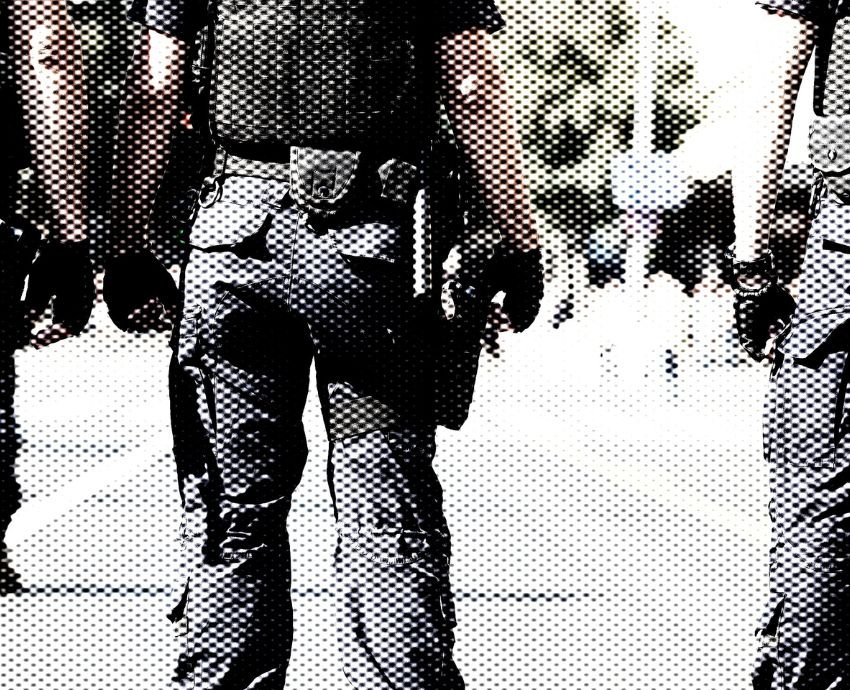
The Civilian Review and Complaints Commission (CRCC) — the federal agency responsible for overseeing the Royal Canadian Mounted Police (RCMP) — has found that officers from the RCMP’s Community-Industry Response Group (C-IRG, since renamed the Critical Response Unit (CRU-BC)) violated the constitutional rights of activists protesting the logging of old-growth forest in the Fairy Creek watershed, British Columbia.
The investigation was announced in March last year, with the findings published on September 11 in the CRCC’s initial summary of its final report.
The CRU-BC is a secretive, tactical unit of the British Columbia RCMP created to protect extractive capital, serving as a security force for corporations. Indigenous land defenders call them “Indian fighters” and “oil and gas mercenaries”. Its officers have been primarily deployed to dismantle blockades — using helicopters, police dogs and drones — at sites of extractive capital, such as fossil fuel pipelines and logging areas.
In Fairy Creek, the CRU-BC were deployed to enforce a court injunction that made it illegal to block logging operations. They arrested more than 1000 people during protests spanning over a few years.
Capital Daily found that the RCMP spent CAD$3.75 million (A$4.11 million) over five months in 2021 on enforcing the court injunction, $2.45 million (A$2.68 million) of which was solely on officer costs. Overall, the unit has cost about $65 million (A$71 million) since its inception in 2017.
Exclusion zones, arbitrary arrests
The CRCC investigation cited that a main violation was the C-IRG’s use of exclusion zones to keep people, even non-protesters and journalists, away from the logging site, and arbitrary arrests of those who questioned the constitutionality of police actions.
One example was the RCMP arrest of a hiker on a public road, captured on video.
First, police stopped a group of hikers to demand that they provide photo identification and consent to bag searches before they could continue, the CRCC report said.
A man in the group questioned the legality of this and asked the police to identify themselves. The police read out their badge numbers, refusing to repeat them when asked or give their names, the report said.
Police arrested the man after he refused to consent to be searched and give his name, as these are violations of his constitutional rights.
The arrested man filed a formal complaint with the CRCC after the RCMP investigated itself and found that officers had committed no wrongdoing, either in arresting the man or refusing to wear name tags.
The CRCC found that the police’s demand to search the man was “unfounded”, and that the subsequent arrest was “groundless”.
The CRCC noted that warrantless searches may only occur following an arrest, or if there is cause to believe the person has committed a crime.
The CRCC found that, contrary to RCMP claims, “there was no evidence that there was a serious risk of violence or even that weapons were being brought into the exclusion zone — instead, the RCMP was worried about letting in any construction materials that some protesters could use to create more obstacles”.
Fascist symbolism
The CRCC also noted that one of the arresting officers was wearing a “Thin Blue Line” patch — a symbol associated with fascist and racist groups in Canada and the United States. It is an expression of the racist and classist belief that the “thin blue line” of police forces protect people from the “undesirables” in society.
The presence of the patch had been criticised by activists, observers and community members.
The CRCC noted that the Thin Blue Line is “divisive or even hateful” and pointed out that the symbol “has been widely rejected as an appropriate or permitted part of police uniforms in Canada — including by the RCMP”.
The CRCC condemned the officer’s aggressive actions when questioned about the patch and informed by activists that it was a symbol of hate. The watchdog asserted that “the RCMP member took a disrespectful and even hostile tone when the man questioned the presence of the patch on the RCMP member’s uniform when it was associated with white supremacist groups”.
Unaccountable force
The CRCC is still undertaking a systemic review of the CRU-BC’s operations and activities in British Columbia. Unfortunately, there are no mechanisms in Canada for holding police accountable in ways that communities need and envision. Oversight agency and inquest findings are typically recommendations with no mechanism for ensuring police compliance.
The CRU-BC has since expanded its scope of operations, now policing Palestine solidarity movements and actions. The unit remains a secretive one — little is known about its internal operations.
Hopefully, CRCC reports will shine more light on this publicly funded security force for capital and provide more supporting materials for Indigenous communities and anti-capitalist organisers, such as Abolish C-IRG, that are mobilising to shut down the unit.